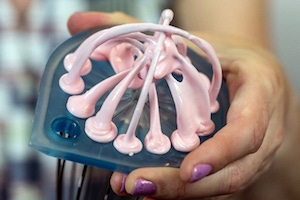Mold it in America? Yes, we can
Inventors and entrepreneurs in the United States are creating plastic products and working with moldmakers and molders right here to get them made. “A lot of these big companies say it’s too expensive to make in America,” said one inventor. “That’s a crock.”
January 27, 2017

Make it in America. Since the election of Donald Trump as President of the United States, this tag line is popping up everywhere. Inventors throughout the USA are creating plastic products and working with moldmakers and molders right here at home. A decade or more ago this was not the case, as inventors found out they couldn’t afford the high prices that moldmakers charged. Many took their inventions to China, where molds were cheap, but learned the hard way that their intellectual property wasn’t safe and that patents meant nothing.
Today it’s a different story. Almost weekly, the “sharks” on the hit TV show Shark Tank are presented with products made from plastic. For example, Lori Greiner, “Queen of QVC” and an inventor herself, bought the idea of the Simply Fit Core Workout Board. This plastic balance board “with a twist” is injection molded in four colors right here in the USA. The two women who invented the workout board, said they were making the board for $9 and selling it for $40. A nice margin for an American-made product, proving that no inventor has to go offshore to make his or her product.
|
Matthew Michel got the idea for the Whisk Wiper while wiping batter from the loops of a whisk with his hands. Molding is done by C&G Mercury Plastics in Sylmar, CA. |
Recently, the Whisk Wiper came to the Shark Tank. The kitchen item, which makes easy work of wiping excess batter from whisks, is sold on Amazon, and by March of this year will be available in four colors. Matthew Michel is the inventor. It was his personal experience trying to wipe batter from the loops of the whisk with his fingers that gave him the idea. On Kickstarter he received 2,072 backers raising $80,370. He now has two patents on the Whisk Wiper. Michel hired a part designer and an engineer to help him work with a moldmaker, and Greg Leighton at C&G Mercury Plastics in Sylmar, CA, does the molding.
Recently, a blog on the Alliance for American Manufacturing (AAM) website told the story of Joe Fox, a former professional race car driver who is now president and CEO of the Dirtball clothing line. He still has a “need for speed,” but today it involves getting his line of Dirtball t-shirts, chinos, jeans, polo shirts and jackets manufactured and out to customers as quickly as possible. To do that, he has 27 different U.S. factories manufacture the products, each specializing in what it does best.
Dirtball has an eco-friendly commitment to manufacturing, making some of the company’s garments from recycled water bottles. “It used to be where you would use a recycled poly fiber for tote bins or carpet, but they kept refining it and refining it and figured out how to get it thin enough to where they can now split it into yarn that can be used for clothing,” Fox told the AAM.
Each Dirtball t-shirt is 100% made in the USA and is composed of seven 16-ounce recycled water bottles and its Dirt Short is made using 25 16-ounce plastic bottles. “For every 100,000 t-shirts Dirtball produces, it keeps 7,000 water bottles out of landfills, 400 tons of carbon emissions out of the air, saves 500 barrels of oil and creates five manufacturing jobs,” according to Fox.
Fox noted that his emphasis was on providing jobs in his hometown of Hickory, NC, where the unemployment rate soared, in his words, almost overnight. “A lot of these big companies say it’s too expensive to make in America,” he told AAM. “That’s a crock.”
About the Author(s)
You May Also Like





